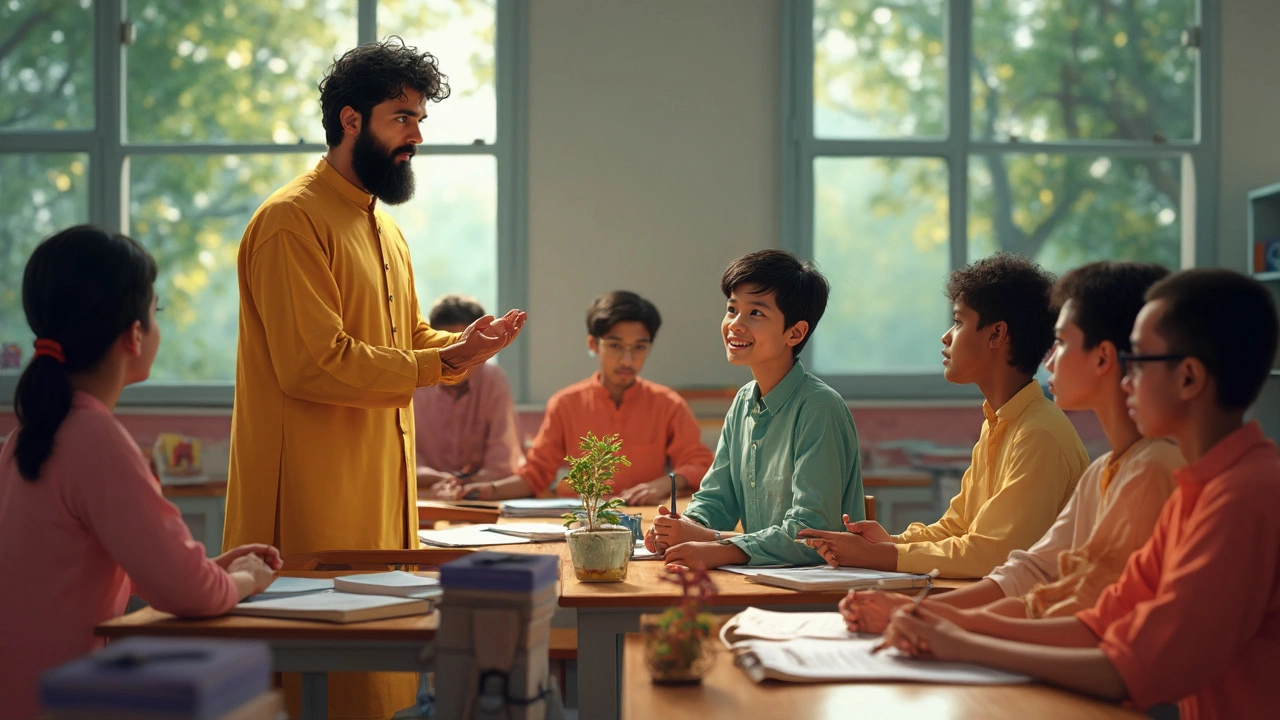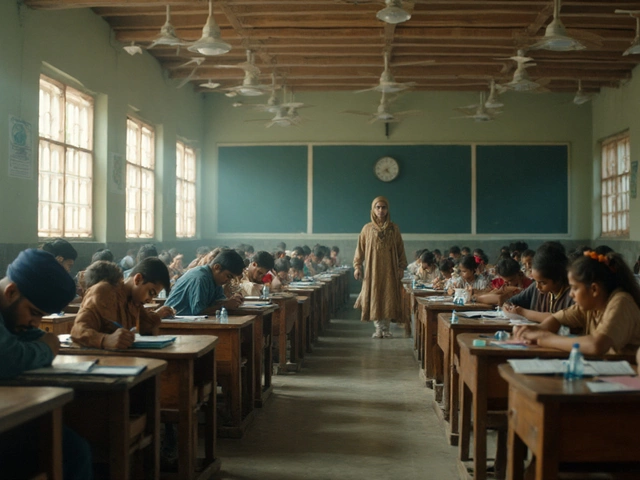
Ever noticed how everyone claims to be 'the best' teacher for NEET? Walk into any coaching center, scroll through YouTube, or check out Telegram groups—you’ll find countless teachers promising top ranks. But what really sets an actual great NEET teacher apart from the rest? It’s not just about being a subject expert or having flashy certificates hanging in their office.
NEET’s a tough nut to crack, and finding the right teacher isn’t one-size-fits-all. Some students swear by those strict, no-nonsense chemistry gurus, while others need a calm, patient mentor for physics fears. The thing is, choosing a coach isn’t about their popularity, but about who clicks with your way of learning. I’ve seen students ace NEET with both big-name teachers and relatively unknown personal mentors—it’s about the fit, not the fame.
Don’t get hooked by slogans like “guaranteed success” or “100% results.” Ask yourself: do you understand their explanations, or do you feel more confused? Do you leave class with notes you actually want to read again, or are you drowning in complicated slides? The best teacher for you will make the toughest concepts look simple and keep you motivated without empty promises.
- What Actually Makes a Teacher 'The Best' for NEET?
- Popular NEET Teachers and Coaching Stars: Who Gets the Hype?
- Qualities to Look for in a NEET Teacher
- Online vs Offline NEET Teachers: What Really Changes?
- Real Stories: What Toppers Say About Their Teachers
- How to Choose YOUR Best NEET Teacher
What Actually Makes a Teacher 'The Best' for NEET?
So, what actually makes someone the best teacher for NEET? Spoiler alert: it's not always about having a viral YouTube channel or a wall full of awards. The real difference lies in specific things most students don’t pay attention to at first.
A top NEET teacher has to make complicated stuff—like human physiology or organic chemistry reactions—look simple. It’s about breaking down jaw-dropping topics into steps you’ll actually remember. If a teacher rattles off points that sound like Greek, you’re wasting your study hours. You want someone who uses real-life examples, visual tricks, or even silly mnemonics that get stuck in your head.
And let’s not ignore results. Some of the most respected NEET teachers track their students' progress every month. It’s not about shaming people who score less, but showing what works and what needs tweaking. Check this out—some coaching institutes found that students with regular feedback sessions had a 30% higher improvement rate:
| Feature | Success Impact |
|---|---|
| Regular doubt sessions | 35% higher concept clarity |
| Weekly tests | 30% more consistent improvement |
| Personal mentoring | 45% better time management |
It also matters how a teacher reacts when you mess up. The best NEET teachers won’t mock silly doubts. They get that every question means someone’s trying to understand. You should feel comfortable—if you’re scared to ask, pick someone else.
Then there’s the teaching style itself. Some teachers stick to the NCERT books and only add what’s needed for the NEET exam. Others flood you with notes far above the NEET level, and you end up lost. Usually, students who stay close to the syllabus and get plenty of NEET-style mock practice rise to the top.
- Clear, simple explanations
- Regular, honest feedback
- Respect for every student’s doubts
- Focus on NEET-specific content
- Practice with real exam-style questions
Look for these things, and you’ll spot the difference between hype and real help. Don’t get distracted by the loudest voice in the room—the best NEET teachers make your path clearer, one small step at a time.
Popular NEET Teachers and Coaching Stars: Who Gets the Hype?
If you’ve spent time searching for the best teacher for NEET, you’ve definitely come across big names like Dr. Hariom Gangwar, Dr. Anand Mani, NK Sharma, and Ashish Arora. These teachers aren’t just well-known in classroom circles—some have millions of followers on YouTube and run their own NEET-focused apps. Their lessons have gone viral for breaking down those weird plant physiology diagrams or tricky physics laws in ways even a stressed-out 12th grader can understand.
The real boost to these coaching stars comes from online platforms. Back in 2018, offline classrooms were packed, but by 2021, experts like Dr. Hariom Gangwar said on India Today, “YouTube and online coaching transformed NEET prep. Students can now compare teaching styles and decide who explains better.”
“A teacher’s reach isn’t limited to their city’s coaching institute—one good video and thousands can benefit instantly.”
This online explosion makes it so easy for students to access lessons by legendary teachers who were once available only in big city centers. Now, even a kid in a small UP town can learn unit conversions from the very same teacher who taught toppers in Kota.
But, does all this online attention actually translate to real results? Let’s look at some facts:
| Teacher | Platform | Students Reached (2024) |
|---|---|---|
| Dr. Anand Mani | Physics Galaxy, YouTube | Over 2 million |
| NK Sharma | Allen Kota, Unacademy | 500,000+ |
| Dr. Hariom Gangwar | YouTube, Own App | 1.2 million+ |
| Ashish Arora | Toppr, YouTube | 900,000+ |
That’s a lot of students, but there’s a catch: not everyone who watches ends up on the NEET merit list. What these teachers are great at is making complex chapters less scary and more manageable, which is half the battle in NEET coaching.
One more thing—don’t just get swayed by high subscriber counts or glitzy Instagram pages. Always try a few classes first, maybe from two or three teachers. See who matches your learning pace and who motivates you to actually open your books and revise. At the end of the day, the hype is helpful, but your own understanding and comfort matter more.
Qualities to Look for in a NEET Teacher
If you’re hunting for the best teacher for NEET, there are some things that actually matter way more than social media hype or aggressive marketing. Here’s what you need to really focus on when you’re making your pick.
- Strong subject knowledge: This one’s non-negotiable. The teacher should know NEET-level concepts inside and out, from the NCERT basics to the trickier HOTS questions that can trip you up. Many top teachers have actually taken NEET themselves, or at least cracked other medical or engineering entrance exams.
- Clarity in explanation: You want someone who can turn tough topics into simple stories. If you walk out of class thinking, “That actually makes sense now,” you’re on the right track. The best NEET teachers use regular examples, not jargon.
- Knows the exam pattern and trends: NEET isn’t static. Paper trends shift. The right teacher keeps track of recent years’ question ratios between topics, new question types, and marks weightage changes. Basically—they’re not teaching old-school while the exam moves ahead.
- Patience and approachability: NEET prep is stressful. There’s no point in a teacher who’s great at physics but makes you feel nervous asking “silly” questions. You want a teacher who’s open for doubts, not just in class but after, and doesn’t act grumpy about it.
- Gives regular feedback: The best teachers don’t just finish the syllabus and vanish. They run regular tests, review your mistakes, and actually help you get better. If a teacher never points out your weaknesses, that’s a big red flag.
A quick reality check: a 2023 survey of 700 NEET aspirants in India found the following teacher qualities mattered most (in order):
| Quality | Percent who said it matters most |
|---|---|
| Clear explanations | 42% |
| Personal attention to doubts | 24% |
| Crystal knowledge of NEET pattern | 18% |
| Test practice and feedback | 13% |
| Makes learning fun | 3% |
If you’re paying for NEET coaching, demand these standards. Grab a trial class if possible. Ask seniors about a teacher’s style. Read reviews—but watch out for obvious fake ones. You want honesty above all, because what works for your friend may not work for you. Always check if you’re actually learning, not just half-listening and hoping for the best.

Online vs Offline NEET Teachers: What Really Changes?
The big debate in NEET coaching these days is online vs offline learning. Both styles have their fans—and their critics—but it really comes down to what helps you stay on track and actually learn, not just watch or listen.
Offline coaching feels more traditional. You walk into a classroom, sit with other students, and have a teacher right in front of you. The biggest perk? If you’re stuck on a chemistry equation, you can raise your hand and ask for help right away. There’s also peer pressure (the good kind) so you keep up with homework because everyone else is doing it too. Many students say being in a real class helps them focus—less chance of zoning out or getting distracted.
But let’s not ignore what’s changed post-2020. Online NEET classes boomed after lockdowns. Now, instead of commutes and crowded classes, you can study from your own room. Flexibility is the name of the game. Classes are recorded, so you can pause, rewind, or revisit tricky topics at any hour. Platforms like Unacademy and Physics Wallah have made top NEET teachers available to everyone with an internet connection, not just students in big cities.
There’s also a money angle. Online coaching often costs less than big offline centers because there’s no fancy building or printed books to pay for. Here’s a quick comparison:
| Online Coaching | Offline Coaching | |
|---|---|---|
| Average yearly fee | INR 25,000 - 40,000 | INR 60,000 - 1,20,000 |
| Doubt-clearing support | 24/7 chat, forums, scheduled live sessions | Mostly during class, some after class |
| Test series access | Online, anytime | Usually as per timetable |
| Personal attention | Challenging if class is very large | Can be better in small batches |
But let’s be real, online isn’t perfect. Not every teacher is a good communicator on camera. Some sessions feel rushed or one-sided, and if you’re not disciplined, Netflix or Insta can win your attention. Also, tech troubles can mess up live classes—bad WiFi, anyone?
So, what’s the best move? If you’re self-motivated and want access to top NEET teachers no matter where you live, online is a solid pick. If you learn better with hands-on support and a fixed schedule, offline could fit you better. Don’t let trends or ads decide. Try a few demo classes both ways. See what actually helps you crack the concepts, not just clear the syllabus.
Real Stories: What Toppers Say About Their Teachers
People love to know what NEET toppers really think about their coaches—are the legends true, do they have a favorite, and how much did a teacher really matter? Let’s look at what some recent NEET toppers (we’re talking about those who scored in the top 100) have to say about their NEET teachers.
Take Tanishka, who grabbed AIR 1 in NEET 2022. She often shared in interviews that her teachers never skipped the basics. Instead of pushing endless practice papers right away, her biology teacher explained topics using simple daily-life examples: mitochondria as the cell’s “powerhouse” using the battery backup in her school computer lab as a demo. She said having a teacher who broke tough chapters into mini-stories made revision so much easier.
Then there’s Shoaib Aftab, the first NEET aspirant to score a perfect 720/720 (NEET 2020). He’s said more than once that a great teacher always takes doubts seriously, no matter how silly they sound. He recalled his physics teacher, known for late-night doubt sessions, treating every question as important. Shoaib admitted that these Q&A marathons made concepts stick in his mind much better than just reading theory.
Here’s a quick table showing what toppers noticed about their best NEET teachers:
| Toppers | What Worked Best |
|---|---|
| Anurag (NEET 2023, AIR 11) | Set daily goals and checked progress individually |
| Alisha (NEET 2022, AIR 7) | Used lots of visuals and diagrams for complicated concepts |
| Karthik (NEET 2021, Top 50) | Practiced past year questions with detailed, honest feedback |
A lot of toppers, frankly, aren’t obsessed with whether their teacher is famous. They talk more about things like:
- Getting regular feedback instead of just lectures
- Having open channels (like WhatsApp or after-class time) for quick doubt clearing
- Receiving practical tips on exam strategy, not just heavy theory dumps
- Being encouraged, especially after a bad mock test or a silly mistake
So, the secret sauce? Students who crush NEET say great teachers keep things real, care about your progress, and never let your doubts pile up. It’s not magic, just genuine attention and smart teaching that makes all the difference.
How to Choose YOUR Best NEET Teacher
Picking the best teacher for NEET feels overwhelming, especially with every coaching ad shouting about their results. But here’s the thing: the right fit for you might be totally different from what your friend needs. You don’t have to follow the crowd. Focus on what actually helps you understand better.
Start by checking the basics. Does your teacher’s explanation style make even tough topics click? Many NEET toppers say a clear, simple approach beats complicated genius talk any day. Sit for a few demo classes—most good coaching centers (like Aakash or Allen) offer trial sessions before you commit. Trust your gut in those classes. Do you feel lost, or are you picking up tricks that make sense?
- Look for teachers who use real NEET questions in their lessons, not just textbook stuff. Practice with actual questions is what gets you exam-ready.
- Check if the teacher encourages you to clear doubts anytime, not just rush through topics. Doubt-solving sessions are gold—you won’t get stuck before exams.
- Notice the batch size. In smaller groups, you get more attention. If you’re stuck in a 100+ student class, it’s easy to get ignored.
- Ask for student feedback. Nothing tells you the truth like hearing from folks who’ve learned with them before.
Don’t skip the research online either. Google reviews, Quora threads, and even Telegram groups have brutally honest opinions about most NEET coaching teachers and institutes. Just watch out for fake reviews—multiple similar comments posted on the same day are often paid for.
| Factor | Why It Matters |
|---|---|
| Demo Classes | Helps you judge teaching style and if it connects with your learning |
| Doubt Clearing | Quick resolution prevents knowledge gaps close to exam time |
| Track Record | Results from previous years show if students actually improve |
| Availability | You want a teacher who picks up your doubts, not just vanishes after class |
| Batch Size | Smaller batches mean more attention for your personal weak spots |
Here’s what Dr. Anand Mani, well-known NEET educator, says about this process:
“NEET toppers are not always taught by ‘celebrity teachers.’ The right mentor for you is someone who simplifies subjects, keeps you honest with practice tests, and supports you when you hit a wall.”
In the end, take your time before you pay any fees. Don’t get fooled by glam ads or pushy counselors. The best teacher for NEET will help you grow both in confidence and marks. That’s your sign you’ve picked the right one.
More Articles

Easiest Government Jobs in 2025: Low-Stress Careers with High Benefits
Wondering about the most easiest government jobs? Get facts, tips, and surprising insights in our deep dive on stress-free government careers in 2025.

What Country Is #1 in Math? Breaking Down the Real Winners
Ever wondered which country actually leads the world in math? This article digs into competitive exam results, global rankings, and the intense training routines behind those jaw-dropping scores. From Asia to Europe, find out what sets top math countries apart. Get fun facts, practical benchmarks, and tips to boost your own math game. Anyone prepping for exams or just curious about the numbers will find this a must-read.

